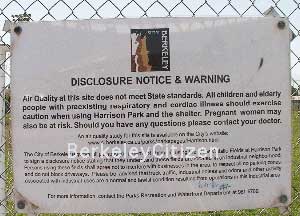
Something Rotten with Sports
Field Deal
City of Berkeley
Something Rotten with Sports Field Deal
L A Wood, Berkeley Voice, January 14, 2000Last month, the city approved the purchase of the University of California's Fourth and Harrison streets parcel to make way for a sports facility at the West Berkeley industrial lot.
The pending sale has added sparks to an already heated public debate over the feasibility of constructing a children's playing field complex amidst the smokestacks of Berkeley's manufacturing district and the auto traffic emissions of Interstate 80. Among the many points of concern has been the UC practice of dumping its construction soils and debris on the Harrison lot and the impact that these activities have had on the site's soil investigations.
The public challenge to an incomplete Harrison evaluation has been met by the city's Toxics Management Division's insistence that the environmental review is adequate and staff's repeated assurances of future soil sampling.
All of this now appears to be moot by UC's most recent move to cover up more of the site with soils from its current Albany Village construction project.
It hardly takes a soil scientist to understand the likely impact on the toxic profile of this acreage by this practice. It may be difficult to estimate whether all the fill soils from the Albany Village area were clean, but there's no question that this current dumping has obfuscated the results of the soil investigations paid for by the city in 1997. UC's soil dumping has severely distorted this year's California Environmental Quality Act (CEQA) review of the site as well. Even the state's Department of Toxic Substances Control, the "big guns" called in by the city's Toxics Division to legitimize their soil investigations, have been left with little choice but to look the other way.
The city, DTSC, and especially UC know full well that the university's actions have invalidated the past site soil investigations, and that these cavalier actions are not likely to receive any challenge.
It is not difficult to see that UC has very conveniently avoided a meaningful CEQA review, and hence, avoided the public process.
Whether the City's actions are simply unethical or actually illegal will most likely remain undetermined.
Why have the city, the purchaser of the property and DTSC being so silent on this matter? City staff's posturing over the quality of its soil investigations and their overt dismissal of public criticism is a bit ridiculous when taken in context of UC's latest dumping activities.
In fact, this most recent dumping of soils took place a few days after the property had been placed in escrow. UC's activities are highly irregular given the sale and escrow, the ongoing site evaluations, and that no use permit has been issued for this property.
No less questionable is the city's intent to develop a recreational complex with a nonprofit group called the Association of Sports Field Users.
Perhaps to some it would seem impertinent to ask about the legality of the city developing an ordinance for any group who would stand to benefit financially. Yet a recent public records request revealed that in July, 1999, barely six months after ASFU was chartered, the city manager signed a professional services contract providing for up to $24,000 to facilitate the participation of ASFU and their consultants at city meetings, and of course, to design and develop the $2 million park facilities.
The ASFU contract issued by the city manager may not be subject to a competitive bid process, but it appears that this July 1999 contract has in effect created the waiver of the city's competitive bidding requirement for the Harrison Playing Fields Project.
This was five months before this project was legally considered by the Berkeley City Council and an ASFU ordinance enacted. ASFU's inside track and back room maneuvering of the city weren't publicly revealed until the December meeting of the Parks and Recreation Commission where city staff lobbied for the proposed ordinance with ASFU as the single candidate, a candidate already working on the project with the city staff.
It should be noted that under the city's design and building contract guidelines, all work must clearly constitute schematic and programmatic design work described for the fields project. Even the city attorney's office recognizes the difficulty of maintaining this thin legal line.
It appears that city staff working on this project have been caught nudging the cart a little ahead of the horse, Moreover, this special ordinance is being drafted exclusively for ASFU, which has absolutely no track record. The ASFU ordinance provides a waiver for competitive bidding, prevailing wages, and certain bonding requirements. And if ASFU is also awarded the yearly maintenance and management contract and possession of the gate keys, this special interest effort should be recorded in the history books as a politically orchestrated "perfect game."
Finally, those who have been able to sort through this Harrison saga and are able to hear over the dull roar of the soccer crowds, may now understand why some Berkeleyians say that more stinks about the UC Harrison property and playing fields project than its undeniably poor air quality.
Berkeley Citizen © 2003-2020
All Rights Reserved
All Rights Reserved
